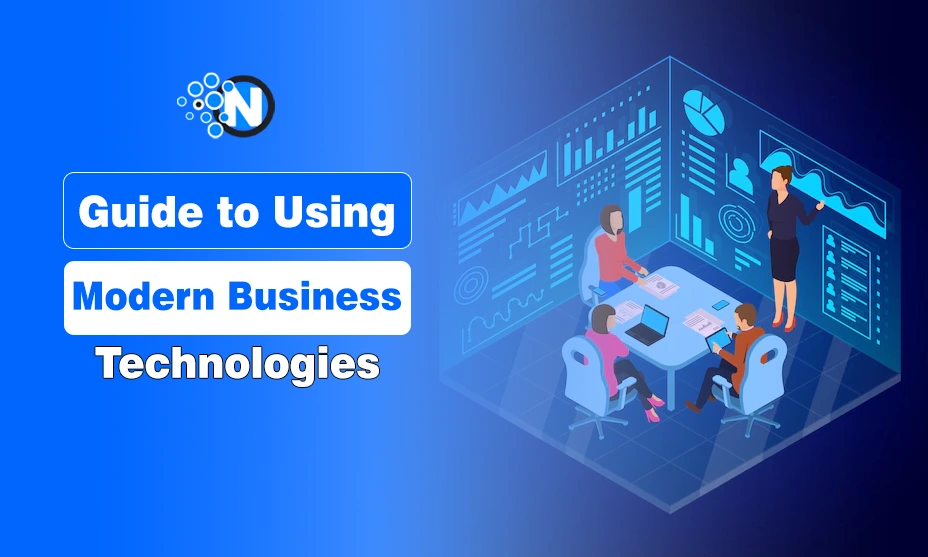A Practical Guide to Using Modern Business Technologies

In today’s fast-paced market, businesses must stay ahead by investing in modern business technology that streamlines operations, enhances efficiency, and fosters innovation. As digital advancements reshape industries, understanding how technology has changed business is essential for sustainable growth and competitive advantage.
In this article, I will explore how to harness the power of AI, blockchain, and other advanced business technologies to drive business success.
Let’s start!
How is Technology Affecting Businesses?
In 2025, technology profoundly affects businesses, reshaping operations and customer communications. Here’s how technology has changed business landscapes so far:
- AI-driven automation. Intelligent systems handle complex tasks, from data analysis to customer service, boosting efficiency and decision-making accuracy. They reduce manual tasks, improve accuracy, and enhance decision-making through machine learning algorithms;
- Cloud-powered flexibility. Scalable solutions allow remote work and effective IT infrastructure, fostering agility in dynamic markets. They enable seamless collaboration, enhance data accessibility, and support real-time decision-making while reducing IT maintenance costs;
- Data-centric strategies. Big data analytics extract valuable insights, driving personalized marketing and predictive maintenance. They provide niche information for better decision-making and market trend analysis, allowing businesses to optimize operations, forecast demand, and enhance customer engagement;
- Cybersecurity imperative. Robust measures protect sensitive data, maintain customer trust, and ensure business continuity in an interconnected world. They detect threats and mitigate risks through advanced encryption, AI-driven threat detection, and multi-factor authentication;
- Digital commerce revolution. E-commerce and innovative payment solutions expand market reach and elevate customer experiences. They streamline transactions, offer seamless omnichannel experiences, and leverage AI-driven recommendations to enhance customer satisfaction.
Cyber space table — image sourced from Depositphotos
Top 5 Business Technologies in 2025
In 2025, innovative technologies are reshaping business landscapes, driving operational excellence, and fostering innovation. Key technologies transforming the business world include:
1. AI and machine learning
This technology empowers intelligent automation, predictive analytics, and personalized customer experiences. AI’s impact on business is substantial, with projections indicating a $15.7 trillion contribution to the global economy by 2030. Businesses are leveraging AI-powered chatbots for 24/7 customer support, while machine learning algorithms optimize supply chain logistics and fraud detection.
2. Blockchain
Blockchain technology enhances transaction security, supply chain transparency, and digital identity verification. Smart contracts automate agreements without intermediaries, reducing costs and improving efficiency. Companies like Walmart use blockchain to track food supply chains, ensuring product authenticity and safety.
3. 5G connectivity
This advanced internet technology enables ultra-fast, low-latency communication for real-time data processing and seamless IoT integration. 5G technology supports remote work with high-speed cloud access and enables advancements in autonomous vehicles, smart cities, and telemedicine, revolutionizing multiple industries.
4. Internet of Things (IoT)
IoT connects devices for improved data collection, monitoring, real-time data sharing, and control, optimizing operations across industries. Smart sensors in manufacturing enhance predictive maintenance, while IoT-powered smart homes and retail stores improve user experiences with real-time automation and inventory tracking.
5. Quantum computing
Quantum computing offers unmatched computational power for complex problem-solving in finance, healthcare, and logistics industries. It accelerates drug discovery by simulating molecular interactions and enhances financial modeling for risk assessment and fraud prevention, providing solutions previously unattainable with classical computing.
To stay competitive, businesses must embrace these innovations, leveraging their potential to drive success in an increasingly digital world.
How to Efficiently Use Modern Business Technology
Organizations must implement strategic approaches to adoption and integration to fully benefit from modern business technology. Let’s explore the key steps to ensure maximum impact:
Assess business needs
Before adopting new technologies, you must clearly understand your organization’s challenges, goals, and operational gaps. This process identifies areas where technology can impact business operations effectively. Consider these factors:
- Map processes to pinpoint inefficiencies;
- Analyze customer feedback for improvements;
- Evaluate competitor strategies;
- Assess staff skills for training needs;
- Review financial data to prioritize investments;
- Align technology goals with business objectives.
Invest in scalable solutions
Investing in scalable solutions allows you to grow your operations efficiently, adapt to changing market demands, and ensure long-term success. Without scalable technology, your business may face costly limitations as you expand or encounter difficulties meeting customer needs. Consider these factors when selecting adaptable technologies:
- Modular architecture for easy expansion;
- API-driven design for seamless integrations;
- Cloud-based infrastructure for flexible resource allocation;
- Microservices for independent component scaling;
- Containerization for consistent deployment;
- Load balancing and auto-scaling capabilities;
- Data analytics tools for performance optimization.
These elements ensure your technology can grow with your business, maximizing ROI.
Enhance digital literacy
According to McKinsey’s Global Digital Lead Rodney Zemmel, ‘Every business leader must become a tech leader’. It highlights the importance of integrating technology into leadership strategies for business growth and innovation. However, to truly leverage technology, business leaders must also empower employees to adapt to and embrace digital tools. To cultivate a tech-savvy workforce, organizations should:
- Conduct regular training sessions on new technologies;
- Encourage a culture of continuous learning;
- Provide access to online learning resources;
- Implement mentorship programs for knowledge sharing;
- Organize hands-on workshops and hackathons;
- Recognize and reward digital skills development.
Prioritize cybersecurity
As companies embrace technology, they face evolving threats that can compromise sensitive data and operations. It is crucial for businesses to proactively address these risks by implementing comprehensive security measures. Furthermore, cyberattacks can lead to financial losses, legal consequences, and damage to a company’s reputation. To protect digital assets, you should:
- Deploy advanced firewalls and intrusion detection systems;
- Encrypt sensitive data;
- Implement multi-factor authentication;
- Conduct regular security audits;
- Establish incident response plans;
- Train employees on best practices;
- Monitor third-party vendor security.
Monitor and optimize
Continuous monitoring and optimization are essential for maintaining business efficiency and staying competitive in this modern digital landscape. Without this proactive approach, businesses may miss opportunities for improvement or fall behind in performance. To ensure optimal results:
- Establish clear KPIs aligned with business objectives;
- Implement real-time analytics dashboards;
- Conduct regular user feedback surveys;
- Perform quarterly technology audits;
- Analyze usage patterns and bottlenecks;
- Stay informed about emerging tech trends;
- Iterate based on data-driven insights;
- Evaluate the ROI of implemented technologies;
- Benchmark against industry standards.
Conclusion
The influence of business technologies on industries is undeniable. Understanding how technology has changed business allows your company to navigate digital transformation successfully. By strategically implementing modern business technology, you can enhance productivity, strengthen security, and stay competitive in an increasingly digital world. Embrace these advancements to ensure long-term success.



